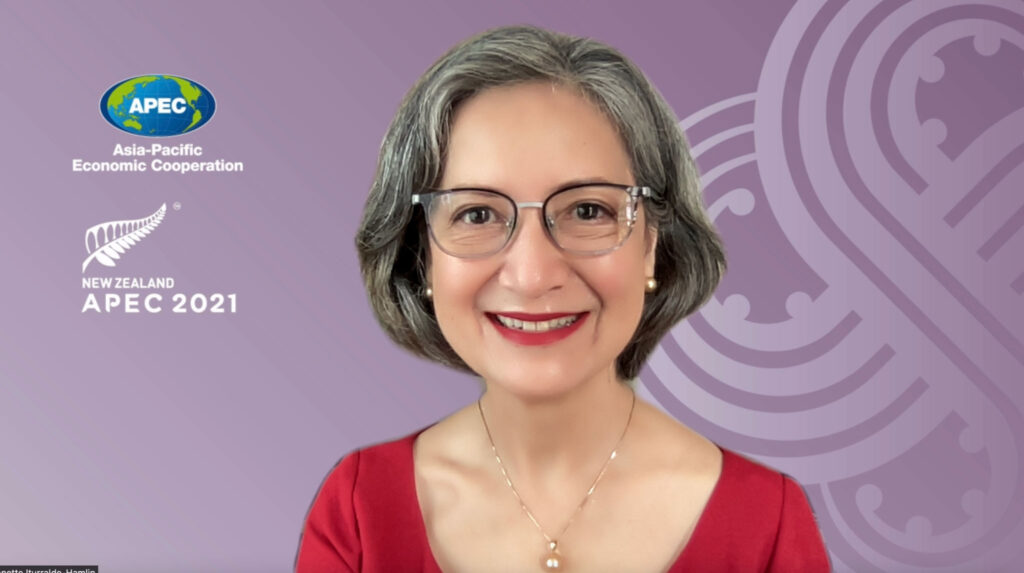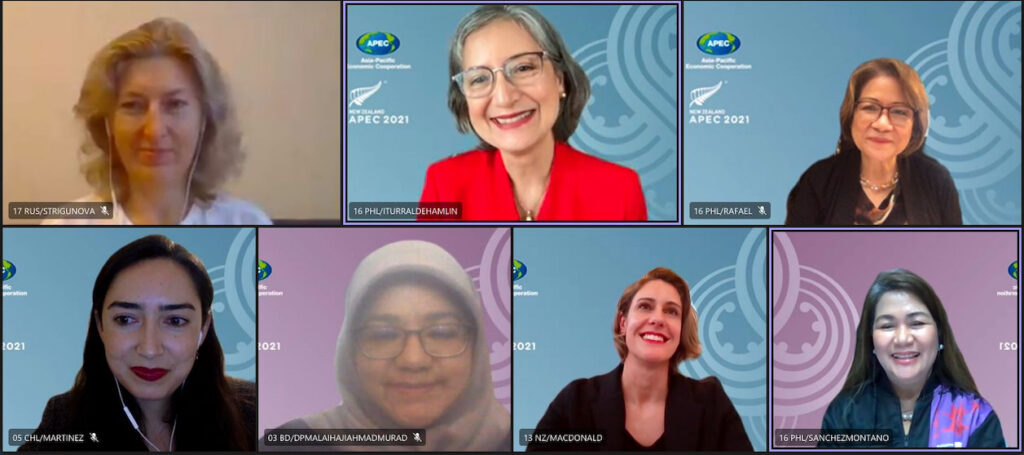Join, Work, Grow. Together.
by Monette Iturralde-Hamlin / August 26, 2021
This was the theme of the recently concluded APEC Policy Partnership on Women and the Economy (PPWE), hosted by New Zealand over three days, August 17, 29 and 21. WomenBizPH president Mylene Abiva and I were honored to be part of the Philippine delegation, which was headed by Philippine Commission on Women chairwoman Sandy Montano.
Indeed, the meetings allowed the different economies to come together and share their ideas and best practices for improving economic empowerment of women.
Day One
The first day tackled PPWE Business, giving updates on La Serena Implementation, the APEC Women and the Economy Dashboard, ongoing work for Women Economic Forum (WEF) and other project updates.
The pandemic has adversely impacted women and girls the most with employment dropping significantly due to job losses, business closure, or their having to leave the workforce to care for relatives affected by COVID 19. Recognizing that the impact of the pandemic will be felt for years to come, APEC PPWE is gearing up to ensure that the necessary policies are in place for women economic empowerment.
The Dashboard 2021 showed continued improvement in key areas regarding women’s opportunities during the period 2008-2020: access to assets and inheritance, access to labor markets, freedom of movement, and ability to start a business or sign a contract in the same way as men (in most economies).
However, there remain persistent barriers arising from weak and contrasting policies as well as socio-cultural gender biases, which hinder women’s participation in the economy. These include contrasting policies with regard to women’s access to credit, employment, education, technology and institutions. In addition, there are still data gaps, especially in sex-disaggregated data, that prevent an accurate depiction of the status of women’s empowerment in the region.

Day Two
Recognizing that the significant gains pre-pandemic on women economic empowerment have taken a deep dive in the past 18 months of the pandemic, APEC PPWE’s Public-Private Dialogue on August 19 focused on how to help women-led businesses survive and thrive in digitally inclusive economies. Representatives from New Zealand, the Philippines, and Chinese Taipei shared how they are supporting the digitalization journey of women-led businesses.
New Zealand’s Ms. Theresa Gattung, former CEO of Telecom and a prominent businesswoman, shared how SheEO raised significant funding through crowdsourcing from women CEOs to help women-owned and women-led businesses get access to funding and training.
Rosemarie Rafael, CEO of Airspeed and WomenBizPH member, shared how Filipino MSMEs have adapted to digitalization, with an estimated 75,000 online businesses registered in 2020. Her own logistics company has launched several digital services during lockdown, such as SpeedFood, SpeedGrocer, SpeedGifts to link entrepreneurs to their customers, and UnBoxMe, a cross-border delivery platform from the US to the Philippines.
From Chinese Taipei, Cathy YeH, principal group PM Manager for Microsoft’s AI + Cloud Engineering Group, shared how she does not feel uncomfortable working in a male-dominated industry. She credits Microsoft’s culture of diversity and inclusion which applies the principles of inclusive design to allow Microsoft to build for everyone, retain its talents and realize their potential.
Rounding up the presentations was Beth Ann LIM, Director of Policy Programs and Public Outreach for Asia Pacific and Global Head of SheMeansBusiness, Facebook. Citing an OECD and World Bank study of 30K SMEs in 50 countries, she said that women-led businesses were more likely to close, to have a drop in sales, and to suffer because of a convergence of social, economic and health issues. To help women-led businesses move from offline to online, Facebook’s SheMeansBusiness provides training on digital platforms and the use of social media for marketing and sales. So far, the initiative has trained over 1M women across various partnerships in digital skills, business resiliency and financial literacy.
Delegates were then transferred to three breakout discussions to tackle the question “Especially in the context of COVID-19 recovery, what can we do to support women-led businesses and also contribute to broader objectives on economic growth and wellbeing?” and to identify key barriers and key enablers.
I facilitated one of the breakout sessions, participated in by heads of delegation from Brunei, Chile, the Philippines, New Zealand and Russia. We had a lively discussion. Key barriers identified included lack of financing and marketing skills; inadequate infrastructure and logistics especially for rural and remote communities; the burden of unpaid care work; and the lack of sex-disaggregated data for analysis. Key enablers included public private collaboration to create an inclusive eco-system; access to funding; skills training in finance, marketing and digital tools and technology; data gathering mechanisms; and mentoring with a gender lens. Chile is working on a multilateral partnership called Regional Alliance for the Digitalization of Women in LAC and the virtual platform. These same issues surfaced in the other breakout sessions, with the addition of family support as an enabler; having male champions for women empowerment; government support and providing access to tools and technology and training in language skills and negotiations.

Day Three
The last day delved with APEC Cross-Cutting Issues. Professor Dong Sun Park, lead shepherd of the Human Resources Development Working Group targets to achieve gender-balanced socio-economic development for and in the 21 APEC member economies by 2030, with the help of PPWE. Areas of collaboration proposed include addressing gender dimension for all HRDWG projects; continuing with the APEC Healthy Women, Healthy Economy initiative and research prize; seeking ways to improve women’s health and access to healthcare; identifying and implementing capacity building projects and activities for women’s socio-economic empowerment; increasing technical, vocation education and training (TVET) as well as continued lifelong education and career development opportunities for women; ensuring equal education opportunity and attainment for women and girls; and enhancing STEM and ICT education for women and girls.
Ms. Norlela bte Suhailee, chair of Small and Medium Enterprise Working Group (SMEWG) emphasized the need for MSMEs to equip themselves with the right skills and knowledge to speed up their inclusion in the digital economy. Aside from digital skills, MSMEs need to build up capability in other business areas, such as finance, marketing, exports, and the like. They need access to finance, to markets, to business mentors, and this can be facilitated by the government working with business to create an eco-system that takes a gender approach.
The presentation by Carlos Kuriyama of the Policy Support Unit on the Role of Women’s Empowerment in Anti-Corruption was an eye-opener. The research shows that women are more vulnerable to corruption because they enjoy less socioeconomic power than men, and because women access certain public services where corruption is likely to be more prevalent. Sadly, in some cases, sex is used as the currency of corruption (i.e., sextortion). Having more women in power can curb corruption because they are typically excluded from established corruption networks, and because they are innately interested in ensuring the delivery of public and social services. This does not necessarily mean that corruption will be eliminated totally as there have been cases of corrupt actions by women. However, involving more women in the anti-corruption efforts can shed light on nuanced issues not covered in current regulations. Collecting and analyzing sex-disaggregated data can also aid in the development of strategies, policies, and legislation to address corruption.
After delivering her closing remarks, Ms. Renee Graham, chair of APEC PPWE New Zealand, handed over the chairmanship of APEC PPWE in 2022 to Mrs. Jatuporn Rojanaparnich, Thailand’s Minister of Social Development and Human Security, and Director of the International Cooperation Group, Office of the Permanent Secretary.
Ms. Renee Graham closed the meeting with warm wishes for continued success of the APEC PPWE, as she said “Our work has finished for the moment. Protect us all. Our friends. Our families. Peace to the universe.”
Read also
- Addressing women empowerment in light of COVID-19
- Mommacon 2021 redefines what it means to be a mom
- Forging friendships with food




